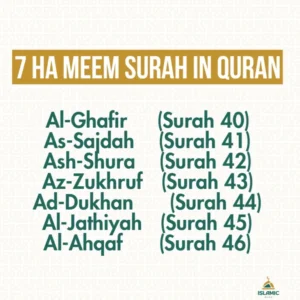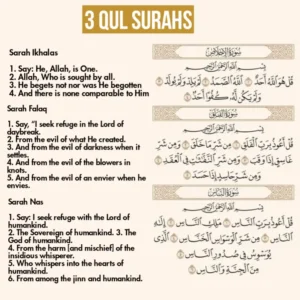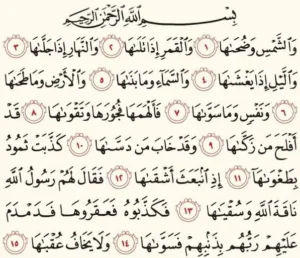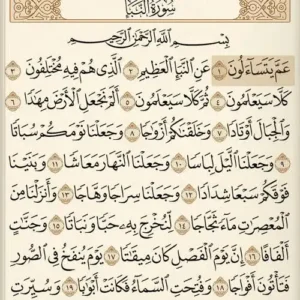Alhamdulillahi Rabbil Alamin Surah in English, Arabic & Transliteration

Alhamdulillahi rabbil alamin surah (Surah Al-Fatiha), or “The Opening,” is the first chapter of the Quran and a vital part of daily prayers in Islam. Its seven verses praise Allah as the Lord of all creation, seek guidance and mercy, and acknowledge our dependence on His compassion and wisdom.
This surah is the foundation of the Quran’s teachings and is considered the greatest chapter of the Quran. In fact, the Prophet Muhammad (peace be upon him) said that any prayer without Surah Al-Fatiha is incomplete and will not be accepted.
Alhamdulillahi Rabbil Alamin Surah in Arabic
بِسۡمِ ٱللَّهِ ٱلرَّحۡمَٰنِ ٱلرَّحِيمِ (1) ٱلۡحَمۡدُ لِلَّهِ رَبِّ ٱلۡعَٰلَمِينَ (2) ٱلرَّحۡمَٰنِ ٱلرَّحِيمِ (3) مَٰلِكِ يَوۡمِ ٱلدِّينِ (4) إِيَّاكَ نَعۡبُدُ وَإِيَّاكَ نَسۡتَعِينُ (5) ٱهۡدِنَا ٱلصِّرَٰطَ ٱلۡمُسۡتَقِيمَ (6) صِرَٰطَ ٱلَّذِينَ أَنۡعَمۡتَ عَلَيۡهِمۡ غَيۡرِ ٱلۡمَغۡضُوبِ عَلَيۡهِمۡ وَلَا ٱلضَّآلِّينَ (7)
Surah Alhamdulillahi Rabbil Alamin Transliteration
- Bismillaahir Rahmaanir Raheem
- Alhamdu lillaahi Rabbil ‘aalameen
- Ar-Rahmaanir-Raheem
- Maaliki Yawmid-Deen
- Iyyaaka na’budu wa lyyaaka nasta’een
- Ihdinas-Siraatal-Mustaqeem
- Siraatal-lazeena an’amta ‘alaihim ghayril-maghdoobi ‘alaihim wa lad-daaalleen
Alhamdulillahi Rabbil Alamin Surah in English
- In the name of Allah, the Most Kind the Most Merciful.
- All praise is due to Allah the Lord of all the worlds;
- The Most Kind the Most Merciful;
- Master of the Day of Judgement.
- You alone we worship and to You alone we turn for help.
- Guide us to the Straight Path.
- The path of those on whom You have bestowed Your Grace; not of those who earned Your anger nor of those who have gone astray.
Names Of Surah Fatiha
Surah Al-Fatiha, the first chapter of the Quran, is known by several names that reflect its significance and themes. Here are some of the most common names associated with Surah Al-Fatiha:
- Al-Fatiha (The Opening): Signifies its position as the first chapter of the Quran.
- Umm al-Kitab (Mother of the Book): Suggests that it summarizes the essence of the entire Quran.
- Al-Hamd (The Praise): Emphasizes its focus on praising and glorifying Allah.
- As-Salah (The Prayer): Reflects its integral role in Islamic prayers, recited in every unit (rak’ah).
- Ash-Shifa (The Cure): Alludes to its spiritual and healing qualities.
- Ar-Ruqyah (The Incantation): Highlights its use as a form of supplication for blessings, protection, and healing.
- Al-Kafiya (The Sufficiency): Suggests that it alone suffices as a comprehensive expression of gratitude, praise, and seeking guidance from Allah.
These names showcase the importance and versatility of Surah Al-Fatiha in Islam.
READ ALSO: Last Ten Surah Of Quran in English, Arabic & Transliteration
Understanding Surah Al-Fatiha
Surah Al-Fatiha, the first chapter of the Quran, is a multifaceted passage with various names and interpretations.
While some scholars emphasize its significance as “The Opening” or “The Praise,” others highlight its role as a comprehensive expression of gratitude and seeking guidance.
The word “hamd” means praise and thankfulness, emphasizing the pure praise of Allah and gratitude for His blessings.
We begin each day by acknowledging Allah’s power and mercy, saying, “Praise be to Allah who brought us to life after causing us to die.”
Surah Al-Fatiha affirms Allah’s sovereignty over all aspects of life, describing Him as the “Lord of all the worlds.” This emphasizes His mastery over everything seen and unseen, and His role as the ultimate judge on the Day of Judgment.
The passage also highlights Allah’s mercy, knowledge, and forgiveness, which encompass all existence.
It serves as a reminder of accountability in the afterlife, encouraging believers to remain steadfast in the face of adversity and warning wrongdoers of impending punishment.
The surah’s central message is a heartfelt supplication, seeking guidance and protection from Allah. It emphasizes the importance of worshiping Allah alone and seeking His help, while acknowledging our dependence on Him.
The “Straight Path” referred to in the surah is the path of righteousness, guided by Allah’s grace and exemplified by the prophets, truthful, martyrs, and righteous individuals. Muslims are instructed to pray for guidance and remain constant on this path.
The repetition of Surah Al-Fatiha in daily prayers is essential, just like physical cleansing, to continually seek Allah’s pleasure and protection from the whisperings of Satan.
By reciting this surah, we reaffirm our commitment to the Straight Path and seek Allah’s guidance in our lives.

The Virtues of Surah Al-Fatiha
Surah Al-Fatiha holds immense significance and offers numerous blessings, including:
- Essential component of prayer: It is a pillar of prayer, and no prayer is valid without its recitation (Al-Bukhaari, 756; Muslim, 394).
- Best Surah of the Quran: At-Tirmidhi (2875)
- Seven oft-repeated verses: Allah refers to it as the “seven oft-repeated ones” in Surah Al-Hijr (15:87).
- Comprehensive supplication: It combines seeking closeness to Allah through praise, humility, and affirming His oneness, followed by the crucial request for guidance.
- Includes all three types of Tawheed: Divine Lordship, divinity, and divine names and attributes.
- Promotes well-being: It addresses the well-being of both hearts and bodies.
- Refutation of falsehood: It serves as a refutation of false beliefs and innovations in various religions and sects.
- Summarizes divinely-revealed Books: Surah Al-Fatiha encapsulates the essence of all revealed Books (Madaarij as-Saalikeen, 1/74).
- Most beneficial supplication: Shaykh al-Islam Ibn Taymiyah considers its request for help to do what pleases Allah as the most beneficial supplication (Al-Fatiha, 1:5).
Surah Al-Fatiha’s brevity belies its profound significance, making it a fundamental part of Islamic prayer and a powerful supplication.
Hadith
Abu Huraira reported: The Prophet, peace and blessings be upon him, said, “Allah Almighty said: I have divided prayer between Myself and My servant into two halves, and My servant shall have what he has asked for.
When the servant says, ‘All praise is due to Allah the Lord of the worlds,’ Allah says: My servant has praised Me. When he says, ‘The Gracious, the Merciful,’ Allah says: My servant has exalted Me.
When he says, ‘The Master of the Day of Judgment,’ Allah says: My servant has glorified Me and my servant has submitted to Me.
When he says, ‘You alone we worship, You alone we ask for help,’ Allah says: This is between Me and My servant, and My servant will have what he has asked for.
When he says, ‘Guide us to the straight path, the path of those whom you have favored, not those who went astray,’ Allah says: This is for My servant, and My servant will have what he has asked for.”
Source: Sahih Muslim 395






